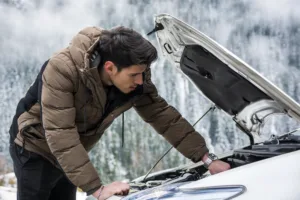Winterizing Your Assets
Protecting Your Investments During the Cold Season

As winter approaches, it’s essential to safeguard the assets you’ve invested in, such as your car, boat, RV, and home. These investments can be significant, and taking steps to protect them during the winter months is crucial. In this article, we’ll guide you through the process of winterizing your assets, ensuring that they remain in good condition and continue to provide value despite the challenges of winter.
Protecting Your Vehicle
- Winter Tires: Consider switching to winter tires to ensure better traction and handling on snowy or icy roads. Proper tires can prevent accidents and potential damage.
- Routine Maintenance: Schedule a comprehensive check-up for your vehicle before winter sets in. This includes inspecting the battery, brakes, heating system, and fluids to avoid breakdowns in freezing conditions.
- Invest in a Car Cover: If you have a vehicle you won’t be using during the winter, consider investing in a car cover. It shields your car from harsh weather conditions and preserves its exterior.
- Garage or Covered Parking: Whenever possible, park your vehicle in a garage or under a covered area. Sheltering your vehicle from the elements can prevent weather-related damage.
Protecting Your Boat
- Winterizing the Engine: If you’re not using your boat during the winter, it’s essential to winterize the engine properly. This involves draining water from the cooling system, adding antifreeze, and protecting the engine from freezing temperatures.
- Storing Your Boat: Consider indoor storage or shrink-wrapping your boat to shield it from snow, ice, and freezing temperatures. Outdoor storage should include a boat cover and proper supports to prevent damage.
- Bilge and Pumps: Ensure the bilge is dry and clean, and check that bilge pumps are operational. A dry bilge prevents mold and mildew growth during the winter months.
Protecting Your RV
- Winterizing Plumbing and Water Systems: Drain the water lines, empty the holding tanks, and add antifreeze to the plumbing system to prevent freezing and damage.
- Tire Maintenance: Keep RV tires properly inflated and covered to prevent cracking due to cold temperatures. Periodically move the RV to avoid flat spots on the tires.
- RV Cover: Investing in an RV cover provides an extra layer of protection against snow, ice, and UV damage during the winter season.
Protecting Your Home
- Weatherproofing: Seal any gaps or cracks in your home’s exterior to prevent cold drafts. Ensure windows and doors are properly weather stripped to maintain indoor warmth and lower heating costs.
- Roof and Gutters: Clean your gutters and inspect the roof for any damaged or missing shingles. Addressing roof issues promptly prevents leaks and potential water damage.
- Heating System Maintenance: Schedule a professional inspection of your heating system to ensure it operates efficiently during the winter. Change air filters regularly for optimal performance.
- Pipe Insulation: Insulate exposed pipes to prevent freezing and potential burst pipes. This safeguards against costly water damage and repairs.
Winterize All Assets
Winterizing your assets is essential to protect your investments and ensure they remain in good condition during the cold season. Whether it’s your vehicle, boat, RV, or home, taking proactive steps to shield them from harsh weather, perform routine maintenance, and invest in protective covers or storage can save you time, money, and headaches in the long run.
If you are looking for Insurance on any of these products, UCCU can help you protect them!
- Previous
- Why Banks Are Essential:


